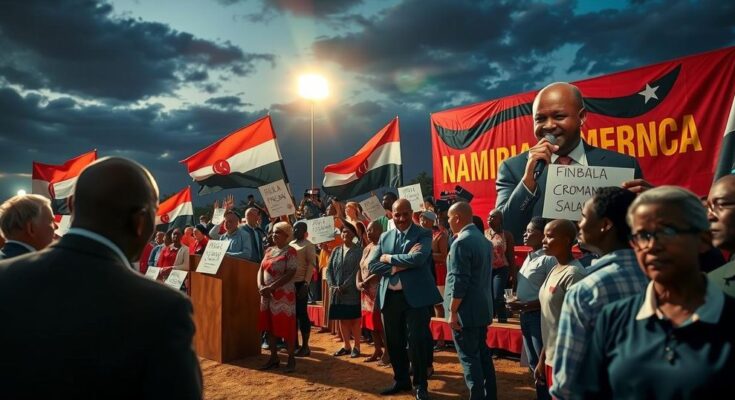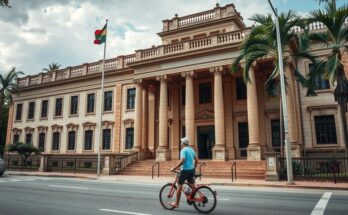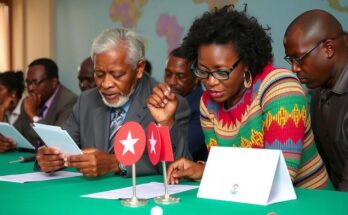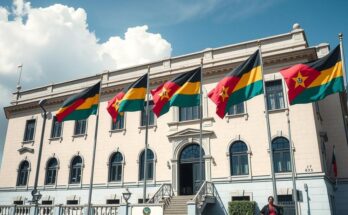Namibia is set for competitive presidential and parliamentary elections on November 27, 2024. Growing discontent with the ruling SWAPO party and strong competition from opposition candidates like Panduleni Itula could significantly impact election outcomes. Key issues include economic inequality, unemployment, and housing crises. Voter turnout, particularly among the youth, will be decisive in determining SWAPO’s future. Concerns linger about potential delays in result announcements due to a switch back to paper ballots.
Namibia is preparing for a pivotal election on November 27, 2024, amidst a backdrop of increased political competition and discontent with the ruling SWAPO (South West Africa People’s Organisation) party, which has maintained power since the nation gained independence in 1990. The upcoming presidential and parliamentary elections may witness significant political shifts, influenced particularly by the growing dissatisfaction among the youth and recent trends of electoral upsets across Southern Africa.
During the elections, approximately 1.45 million registered voters will select candidates from 21 competing parties for parliament and 15 for the presidency. The leading contender from SWAPO, Vice President Netumbo Nandi-Ndaitwah, aims to become the nation’s first female president; however, she faces formidable challenges amid declining support for her party. The youth are particularly disillusioned about SWAPO’s governance, as evidenced by its drop in electoral share over recent cycles. Analysts argue that although opposition parties present a formidable challenge, their lack of organization may still allow SWAPO to retain power.
Among the candidates is Panduleni Itula, who previously garnered significant support as an independent candidate and is now contesting with his own party, the Independent Patriots for Change (IPC). He appeals to younger voters with promises of economic reform and job creation. Similarly, McHenry Venaani from the Popular Democratic Movement and Bernadus Swartbooi from the Landless People’s Movement represent critical opposition voices, advocating for land redistribution and addressing socioeconomic inequalities.
Key issues dominating the electoral discussion include socioeconomic disparities, with over 64 percent of the population living below the poverty line and high unemployment rates among youth. Additionally, the long-standing housing and land reform crises continue to exacerbate tensions, which parties like the Affirmative Repositioning movement aim to address through more radical measures.
The electoral commission’s decision to revert to paper ballots may impact the announcement of results, potentially leading to allegations of fraud if delays occur. Nonetheless, historical patterns suggest that the elections are likely to be peaceful. As Namibians head to the polls, the results will significantly shape the political landscape and the socio-economic future of the country.
The context surrounding Namibia’s electoral landscape is characterized by growing dissatisfaction with the ruling SWAPO party, amidst regional electoral upsets in Southern Africa. This situation raises questions about SWAPO’s ability to maintain its long-standing hold on power amidst increasing youth dissatisfaction and competition from emerging parties. The upcoming elections are set against a backdrop of economic challenges, high unemployment rates, and pressing social issues, such as land reform and inequality, which could sway voter sentiment significantly. As political dynamics shift, the 2024 elections are examined not just in relation to domestic affairs but also as part of a broader trend encapsulating electoral politics in the region, influencing the strategies and positions of various political entities in Namibia.
In summary, Namibia’s upcoming elections present a critical juncture that may redefine its political landscape. With SWAPO’s historical dominance facing unprecedented challenges, particularly from youth discontent and fragmented opposition, the results on November 27 will be crucial. The electoral outcome will hinge on voter turnout and the ability of opposition parties to capitalize on the prevailing socioeconomic grievances. As the nation prepares to vote, the international community will keenly observe the developments, hoping for a fair and peaceful electoral process.
Original Source: www.aljazeera.com




